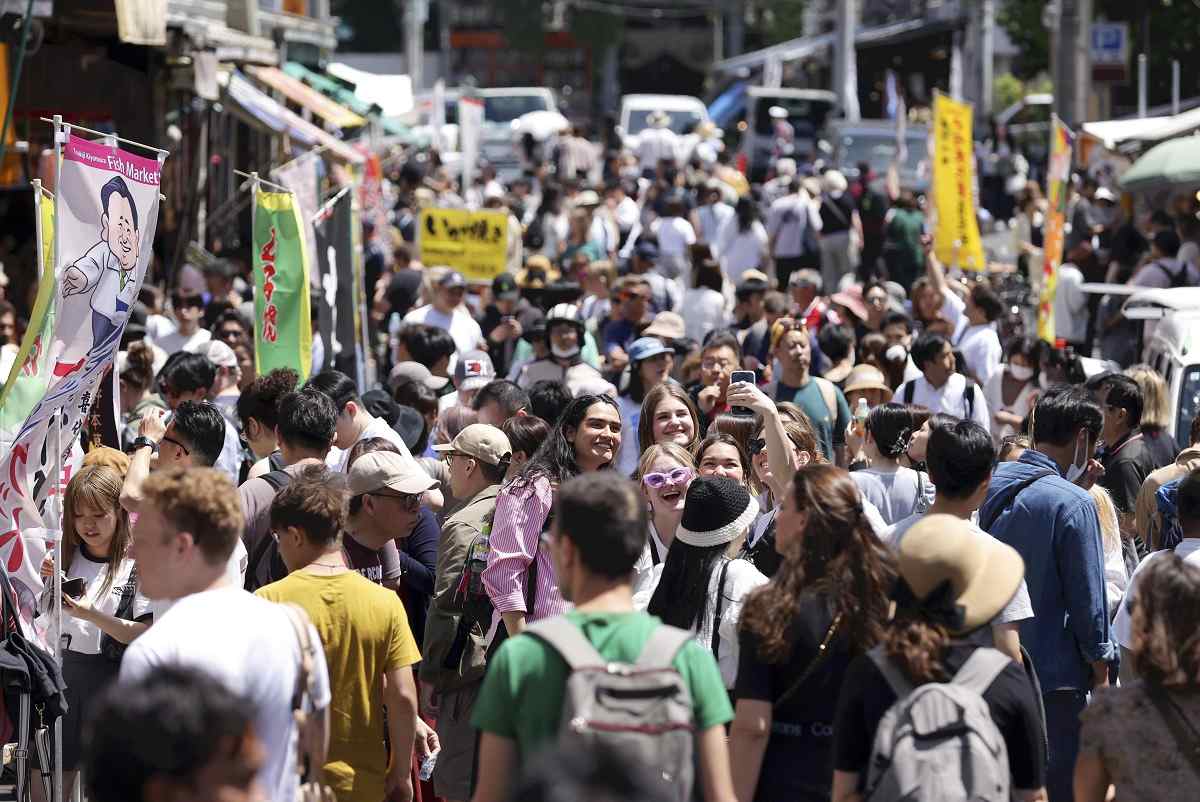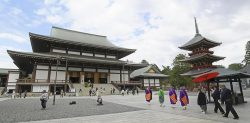Tsukiji Outer Market; surviving and thriving / Tsukiji Outer Market Striving to Preserve Food Culture amid Redevelopment

Throngs of overseas visitors walk in the Tsukiji Outer Market in Chuo Ward, Tokyo, on May 11.
The Yomiuri Shimbun
6:00 JST, June 24, 2024
The Tsukiji area in Chuo Ward, Tokyo, is garnering attention thanks to the planned redevelopment of the former site of the Tsukiji Market. Adjacent to the site is Tsukiji Outer Market, crowded everyday with tourists, including those from overseas.
However, after the Tsukiji Market moved to its current site in Toyosu, Koto Ward, in 2018, and following the COVID-19 pandemic, quite a few old, established stores and restaurants in the outer market closed. To protect the Tsukiji brand, concerned parties of the outer market are eyeing cooperation with those involved in the redevelopment.
In April, the Tokyo metropolitan government selected a consortium of 11 firms to work on the redevelopment project. Among them are Mitsui Fudosan Co. and The Yomiuri Shimbun Holdings. The centerpiece of the project is an about 50,000-seat multipurpose-stadium and the area will also feature commercial complexes and office facilities as well as hotels. Tsukiji is envisioned becoming a hub for receiving overseas guests, fostering international exchanges and nurturing innovation. Part of the area will open in 2029 before a full-scale opening in the early 2030s.
Throngs of foreign tourists
On a Saturday in May, the outer market was so busy with people during lunch hour that their shoulders almost touched as they walked by each other. Foreign tourists lined up at restaurants serving bowls of fresh seafood with rice and tamagoyaki rolled omelets. Many young people took selfies of themselves holding food.
Eliza Peterson, a 20-year-old from Oregon, was all smiles as she spoke of her love for Tsukiji and said she would visit three days in a row. She enjoyed eating sushi and wagyu beef sirloin skewers among other food items. Peterson said with amazement that the same food would cost twice as much in the United States.
The Tsukiji market is internationally famous as one of the world’s largest fish markets that provided Tokyo with food for more than 80 years. After the market was relocated to Toyosu in October 2018, the outer market was hit by the pandemic and fell quiet. Now throngs of overseas tourists are visiting again, helped by the historically weak yen.
Driven to closure
Nevertheless, there is no smile on the face of the chairman of a nonprofit organization formed by stores and restaurants in the outer market.
“The enthusiasm right now won’t last forever,” said chairman Yoshitsugu Kitada, 65. He heads the organization Tsukiji Shoku no Machizukuri Kyogikai. “If we think too much about bringing in tourists, Tsukiji will lose its allure.”
The outer market started as a gathering of small stores selling food ingredients and cooking utensils to customers who were mainly professional cooks. There were as many as about 400 stores in its prime, yet the pandemic forced about 30 stores to shut down.
On the other hand, outside businesses see the hustle and bustle in Tsukiji as a business chance to open where others have closed. Stores that are not aware of local manners have increased, which has led to problems like the ground being littered with trash thrown away by customers eating street food.
In April, the Tsukiji organization drew up a guideline for businesses after listening to the opinions of Chuo Ward officials and experts. The guideline asks those opening or renovating stores to use designs that blend in with the surroundings and refrain from using overly bright colors or over-the-top advertisements. In addition, advance approval by the organization is required for those who apply for construction or renovations to the Chuo Ward office.
“We documented the rules for developing this area, so that the Tsukiji district won’t lose its distinctive features,” Kitada said. “We have to make [Tsukiji] into a district where customers wish to come again.”
Place of rest, relaxation
The concerned parties of the outer market are paying close attention to the vast redevelopment project that will be built on the 19-hectare former site of the Tsukiji Market.
The metropolitan government has been adhering to its policy of making the most of food culture in the Tsukiji district ever since the urban development project first came up. “Maintenance and promotion of the lively atmosphere in the Tsukiji district” was clearly stated in a 2018 report compiled by a metropolitan government expert panel. The redevelopment project application guidelines required applicants to consider relations with the outer market while creating synergy with them.
In response, Mitsui Fudosan Co., which was selected as the developer of the project earlier this year, announced its policy to have the complex showcase the food culture of “Edo-mae” in collaboration with the metropolitan government and the outer market. Edo-mae means in the style of Edo, the old name for Tokyo. The company has already unveiled its plan to build a food hall that serves traditional Japanese cuisine and a “food lab,” an institute to promote Japan’s food culture.
“We’d like to make a food community with the basic concept of being loved by local people and providing the real deal,” a Mitsui Fudosan official said.
The company has already provided opportunities to offer explanations about the facility to local businesses and residents and discussed constructing new sidewalks to ease visitor congestion.
“First and foremost, Tsukiji has traditionally been a place where cooks and customers with discerning eyes come and go shopping by themselves,” said Akio Suzuki, the chairman of the union for promoting the Tsukiji Outer Market shopping streets. “I hope [Tsukiji] will continue building close ties with customers from now on, too, and redevelopment will make it a place where people of all ages can have a relaxing time.”
Prof. Hiroto Kobayashi of Keio University, who was involved in drawing up the guideline, said, “In Tsukiji, the principle that it is ‘a professional food community’ is properly shared [among people].”
“The district will undergo major changes due to the redevelopment. It is important to go forward with building the community while safeguarding its principles and valuing discussions.”
Most Read
Popular articles in the past 24 hours
-

Strait of Hormuz Closure Shakes Markets; Prolonged Closure Could ...
-

Iran Situation: Japan Must Exert Diplomatic Efforts without Merel...
-

2 of Japan's Opposition Parties Submit Bill to Revise Political F...
-

Chiba Police to Arrest Japanese National in Midair; Man Accused o...
-

U.S. Urges Citizens to Immediately Depart over A Dozen Middle Eas...
-

Trump Pursues Iranian Decapitation without a Plan for What Comes ...
-

Bank of Japan and Markets: High Oil Prices Increase Difficulty of...
-

Japanese Firms Ban Business Trips, Cancel Vacation Tours Amid Mid...
Popular articles in the past week
-

Milano Cortina 2026: Japanese Gold Medalist Figure Skater Miura S...
-

Tokyo Spends Big on Children, Wins Over Parents
-

Japan’s Miura, Kihara Announce Withdrawal from Figure Skating Wor...
-

Yokohama to Test Out Renewable-Powered Offshore Floating Data Cen...
-

BOJ Keeping Eye on Economy and Takaichi's ‘Proactive Fiscal Polic...
-

Tokyo Measles Patient Traveled to Fukuoka Aboard JAL Planes; Susp...
-

Japan’s Takaichi Speaks on New U.S. Tariff in Upper House, Says P...
-

Nidec Chairman Resigns Amid Accounting Scandal at Major Japanese ...
Popular articles in the past month
-

Producer Behind Pop Group XG Arrested for Cocaine Possession
-

Japan PM Takaichi’s Cabinet Resigns en Masse
-

Man Infected with Measles Reportedly Dined at Restaurant in Tokyo...
-

Israeli Ambassador to Japan Speaks about Japan’s Role in the Reco...
-

Videos Plagiarized, Reposted with False Subtitles Claiming ‘Ryuky...
-

Prudential Life Insurance Plans to Fully Compensate for Damages C...
-

Woman with Measles Visited Hospital in Tokyo Multiple Times Befor...
-

iPS Treatments Pass Key Milestone, but Broader Applications Far f...
Top Articles in Society
-

Producer Behind Pop Group XG Arrested for Cocaine Possession
-

Man Infected with Measles Reportedly Dined at Restaurant in Tokyo Station
-

Woman with Measles Visited Hospital in Tokyo Multiple Times Before Being Diagnosed with Disease
-

Bus Carrying 40 Passengers Catches Fire on Chuo Expressway; All Evacuate Safely
-

Tokyo Skytree’s Elevator Stops, Trapping 20 People; All Rescued (Update 1)
JN ACCESS RANKING
-

Producer Behind Pop Group XG Arrested for Cocaine Possession
-

Japan PM Takaichi’s Cabinet Resigns en Masse
-

Man Infected with Measles Reportedly Dined at Restaurant in Tokyo Station
-

Israeli Ambassador to Japan Speaks about Japan’s Role in the Reconstruction of Gaza
-

Videos Plagiarized, Reposted with False Subtitles Claiming ‘Ryukyu Belongs to China’; Anti-China False Information Also Posted in Japan





